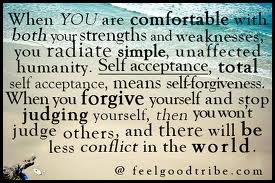Find balance and restore the equilibrium
Find balance and restore the equilibrium
The
term ‘life balance’ seems to be a bit of an oxymoron of late rather than a
state of being.
n pl -riums, -ria [-rɪə]
1. a stable condition in which forces cancel one
another
2. a state or feeling of mental balance;
composure
3. (Physics / General Physics) any unchanging
condition or state of a body, system, etc., resulting from the balance or
cancelling out of the influences or processes to which it is subjected See thermodynamic equilibrium
4. (Physics / General Physics) Physics a state
of rest or uniform motion in which there is no resultant force on a body
5. (Chemistry) Chem the condition existing when
a chemical reaction and its reverse reaction take place at equal rates
6. (Physics / General Physics) Physics the
condition of a system that has its total energy distributed among its component
parts in the statistically most probable manner
7. (Life Sciences & Allied Applications /
Physiology) Physiol a state of bodily balance, maintained primarily by
special receptors in the inner ear
8. (Economics) the economic condition in which there
is neither excess demand nor excess supply in a market
[from Latin aequilībrium, from aequi- equi- + lībra pound,
balance]
Collins
English Dictionary – Complete and Unabridged © HarperCollins Publishers
1991, 1994, 1998, 2000, 2003
We know
that maintaining a healthy life balance is essential for both our happiness and
well-being; it enhances our productivity and careers. A person with a
well-balanced life has a far greater ability to focus their attention and
energy on attaining their goals, taking productive actions and moving forward
in a meaningful way towards self-actualization.
Maintaining
balance might be a first for many, as some might never have known what it means
to live a balanced life, or what it feels like when in a state of balanced
flow…
 … So,
what does life
balance really mean? What would a balanced life look like to us? And
most importantly, how do we go about achieving it within our hectic work – life
schedules?
… So,
what does life
balance really mean? What would a balanced life look like to us? And
most importantly, how do we go about achieving it within our hectic work – life
schedules?
‘Our bodies are well adapted to this state of affairs
and respond appropriately when conditions deviate from their optimal state.
This ability of an organism to maintain equilibrium (balance) by adjusting
appropriately to the external environment is known as homeostasis.
Therein lay the key to understanding balance.
Balance is the taking of appropriate action when circumstances dictate, so as to
maintain equilibrium. It is said that the great achievement of the sages of old
was the achievement of great balance as human beings. How did they achieve
great balance? In the present moment, when things would come up, they would
respond accordingly.'
There
are steps you can take to change what isn’t working and get back some control
and balance in your life. Once you start seeing results you’ll be better
equipped to maintain that new found equilibrium. The key is not to try to
change everything at once, but to make small adjustments over time to determine
what works for you. Eventually you will have a whole new set of positive life
habits and you’ll never look back!
“There is no
secret to balance. You just have to feel the waves.” – Frank Herbert
Some
strategies that work:
Physical
1. Get sufficient exercise. Regular push ups, sit-ups, crunches, jogging or walking are examples. Unless you are
disabled in which case you can learn a modified exercise regimen.
2. Get sufficient rest. About eight hours of sleep
helps the body repair itself. You may personally need more or less, as sleep
requirements vary between people.
3. Eat healthier. Look online and find the food
pyramid, then try balancing your caloric intake with your exercise. There
are several competing food pyramids, so pick one or two because following all
of them would be too hard. “Food
is an important part of a balanced diet.” – FranLebowitz
4. Find time to relax. Just lie down and think about
what you did before you started relaxing, then let it go.
6. Plan out your day, set goals and visualize, but don't stress
out if you don't accomplish everything just the way you planned. Remain
flexible and try different approaches to your goals. Remember, sometimes life
happens, and you may not have time for everything. Just be productive in the
time you have.
7. Write but keep it positive. No negative thoughts. If you
have negative thoughts, do not write them down. Find someone you can vent
negative thoughts to -- pretending to be happy all the time will do no good for
you in the long run.
8. Find out and
develop your talents. Go out and do activities to find what you like and then
pursue the one or two that strike your fancy. If you do three of them that will
be too stressful.
9. Keep a
diary or journal. This would be a good place to write things. Write down
three things or that you appreciate each day.
10. Read. There's something for everyone- check out your local
library & book stores to test the waters.
11. Try to set goals that are reasonable to achieve. Unreasonable goals are harder
and will probably just lead to disappointment.
12. Meditate or pray.
13. Communicate with nature. Go outside, hike, go camping,
or have fishing trip. You may find yourself doing most of the talking.
15. Cooperate with other people that you meet.
16. Listen
to other people. There is difference between just hearing the words and
actually paying attention and listening to them.
17. Mend hurt relationships with loved ones, say sorry.
17. Mend hurt relationships with loved ones, say sorry.
18. Get a good education. To get a good self-supporting
job, master the skills necessary for your advancement. That way you will not be
dependent upon anyone else.
19. The job has to be the one you love. "Love it or leave
it." Or learn to love it!
20. Money is not the most important thing. Fulfilment and Happiness are the most important
things. “Happiness is not a matter of intensity but of balance
and order and rhythm and harmony.” – Thomas Merton
“Finding a sense of balance and harmony at some point
in any aspect of life will soon turn to disharmony and loss of balance if you
try to hold on and freeze that moment forever. Such action is futile and will
only lead to pain and your own suffering. The only constant is change. The
waves come in, break and recede. Then they roll on in again. Instead of
fighting and being tumbled painfully ashore, feel the waves coming and ride
them out.” – Stephen Cox
Live
well!
Marie
Joshua











Comments